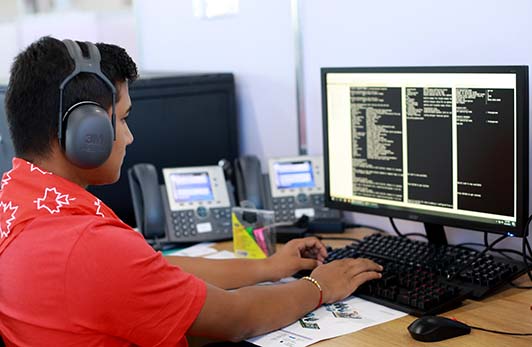Electronics
What is electronics?
As electronics is now incorporated into virtually every sector of the economy, it offers a wide range of job possibilities. Some of these occupations are focused on assembling, testing, repairing and inspecting consumer, and industrial equipment and other electrical products and systems. Others involve designing, developing and testing the production and operation of electrical and electronic equipment and systems. Everything from satellite systems to ski lift controls requires workers with training in electronics.
Specific tasks that electronic technologists and engineers may perform include linking computer networks to hydraulic systems, establishing communication links to remote locations or designing and retrofitting electrical systems. Technicians are involved in the installation, set-up and repair of these same types of systems. Depending on their area of expertise, people in electronics need to know and understand many different electronic concepts with background in the applied sciences. As technology continues to grow and evolve everything could one day be electronically based, which makes electronics an occupation of the future.
Electronics workers perform some or all of the following duties:
- Solder and manually assemble various electronic components such as resistors, diodes, transistors, capacitors, integrated circuits, switches, wires and other electronic parts to designated locations on printed circuit boards
- Assemble microcircuits requiring fine hand assembly, the use of microscopes and adherence to cleanroom procedures
- Install, mount, fasten, align and adjust parts, components, wiring and harnesses to subassemblies and assemblies using hand and small power tools
- Operate automatic and semi-automatic machines to position, solder and clean prescribed components on printed circuit boards
- May replace defective components and repair and overhaul older devices
- Check final assembly for finish, labelling and packaging methods
- Check mechanical dimensions and perform “go-no-go” electrical tests
- Identify and mark acceptable and defective assemblies and return faulty assemblies to production for repair
- Collect, record and summarize inspection results
- Investigate equipment malfunction and instruct on proper operation.
HOW TO JOIN THE FIELD
Completion of secondary school is usually required for electronics assemblers, fabricators, inspectors and testers.
On-the-job training is usually provided for occupations in this unit group.
A two-year apprenticeship and voluntary trade certification is available for electronics assemblers in Ontario and Saskatchewan.
Electronics testers may require post-secondary courses in basic electronic theory, testing techniques and testing equipment.
Electronics inspectors and testers may require experience as an electronics assembler or component fabricator.
INDIGENOUS AND REMOTE CONSIDERATIONS
The electronics industry is slower to catch on in Indigenous and remote communities and people may not have the background knowledge of this field to be interested in it. Jobs in this field may also be hard to come by in Indigenous and remote communities so relocation may be necessary if entrepreneurship is not desirable.
Not all communities have access to reliable, affordable internet and service interruptions are all too common. Access to computers at home is not a given for everyone and Elders and even sometimes younger generations lack computer knowledge, although this situation is undergoing some significant changes at the moment. But even those people in Indigenous and remote communities with interest and high-level skills in computers may not have the same access to opportunities to learn about different programs and may face significant bandwidth issues, limiting their ability to learn and develop in this field. Indigenous and remote students may need qualifying courses or need to augment college learning to be successful in this field.
Although with significant improvements currently underway to internet connections in Indigenous and remote communities, careers in this field become more viable and are likely to become more so in years to come.
DISABILITY CONSIDERATIONS
This job may be challenging for people with physical disabilities to perform. People with learning disabilities may require extra support in post–secondary as well as on-the-job to ensure their success.
Find the right career path for you with our interactive map!
Trouvez le cheminement de carrière qui vous convient grâce à notre carte interactive!
Sample Job Titles
- Electrical Equipment Inspector
- Electronic Products Designer
- Electrical Engineering Technologist
- Capacitor assembler
- Component inserting machine operator
- Electronics tester
Companies and Sectors
- Commercial companies
- Government utilities
- Consulting engineering firms
- Educational institutions
- Resource based industries
- High technology design
- Manufacturing
- Communication companies
- Self-employed

Electronics and the Skills for Success Program
The key Skills for Success for this career path are:
- Numeracy
- Reading
- Adaptability




